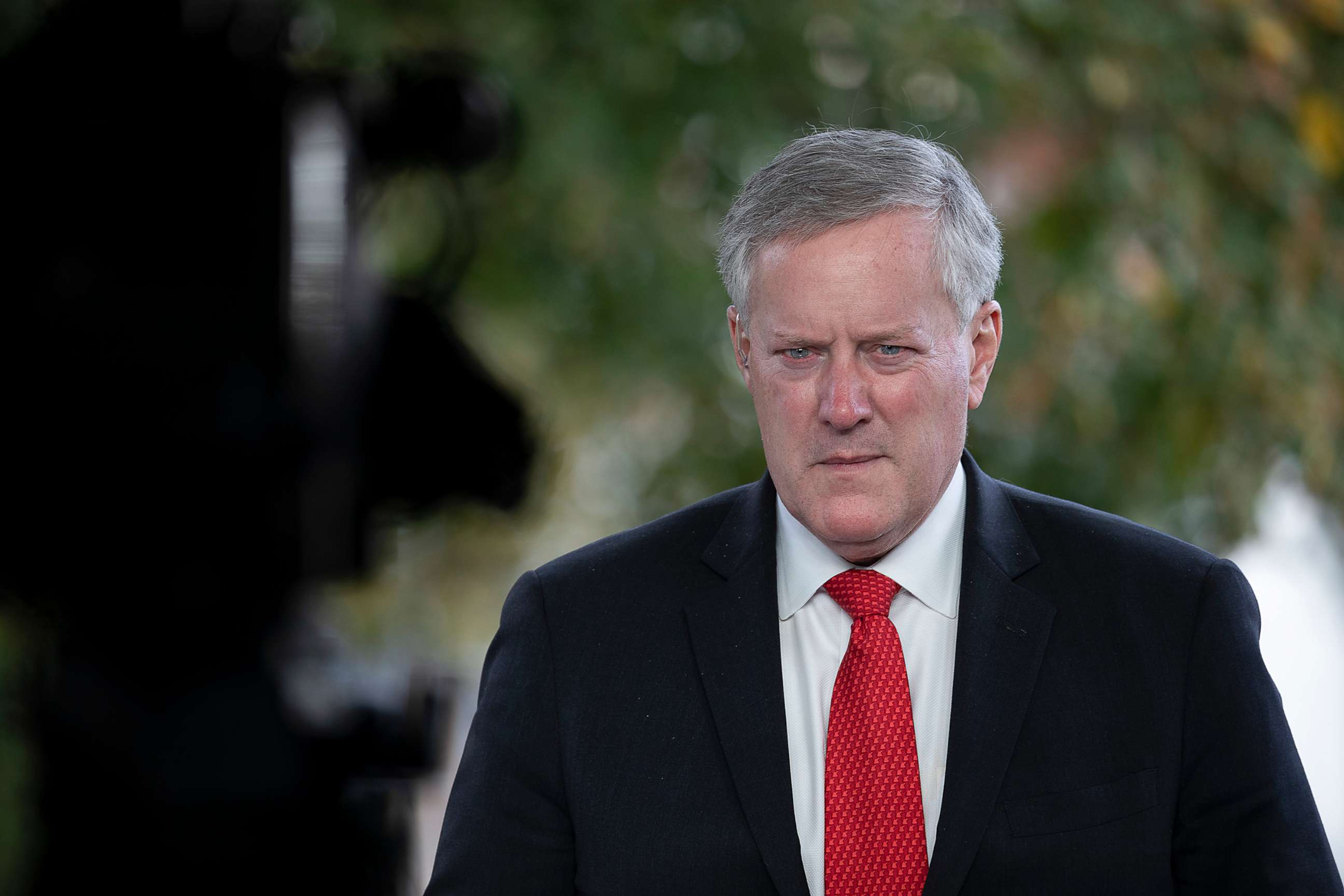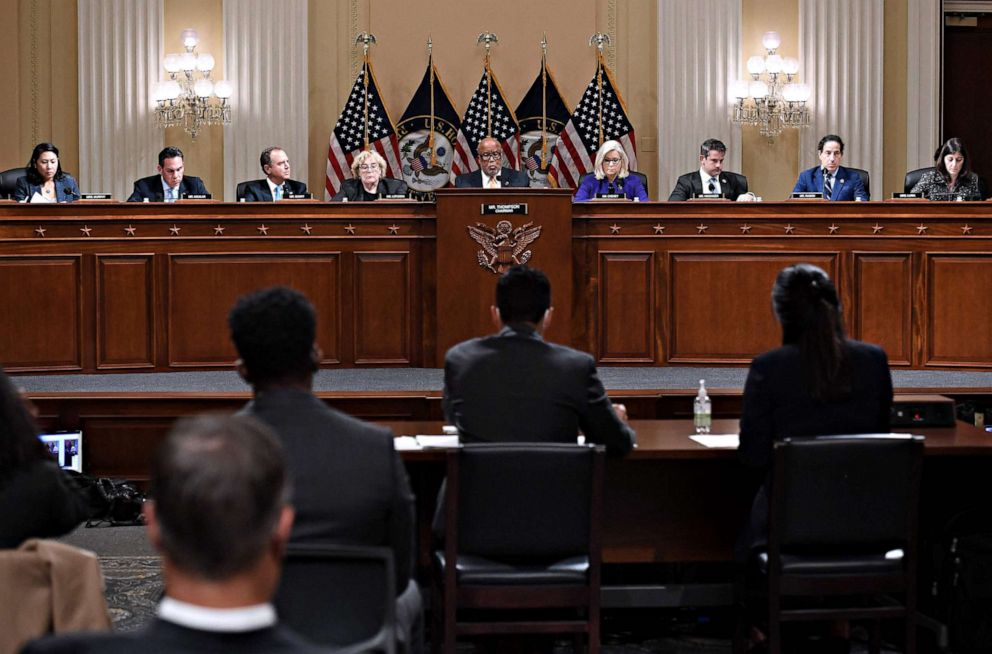Trump's former chief of staff Mark Meadows fails to show for Jan. 6 committee deposition, prompting calls to hold him in contempt
Meadows wants Trump's claims of executive privilege resolved first.
Former White House chief of staff Mark Meadows did not show up his 10 a.m. deposition with the House select committee investigating the Jan. 6 Capitol riot, prompting calls from the panel to have Congress hold him in contempt.
A renewed warning came in the wake of the Justice Department announcing Friday afternoon it had charged former White House chief strategist Steve Bannon with two counts of criminal contempt of Congress over his defiance of a subpoena from the select committee.
"Mr. Meadows, Mr. Bannon, and others who go down this path won’t prevail in stopping the Select Committee’s effort getting answers for the American people about January 6th, making legislative recommendations to help protect our democracy, and helping ensure nothing like that day ever happens again," Committee Chair Bennie Thompson, D-Miss., and Rep. Liz Cheney, R-Wyo., said in a statement.
A lawyer representing Meadows said in a statement Friday morning that "it would be irresponsible for Mr. Meadows to prematurely resolve" the disputes with the committee "by voluntarily waiving privileges that are at the heart of those legal issues."
A federal appeals court intervened on Thursday to temporarily block the National Archives from releasing Trump's White House records ahead of a Friday deadline, forcing a new timeline on the committee because of Nov. 30 oral arguments scheduled for Trump's appeal.

Meadows wants a court to resolve former President Donald Trump's claims of executive privilege before he cooperates with the committee.
"No matter how important the subject matter of the committee's work, decades of litigation over Executive Privilege shows how critically important it is for a president to have access to advice and counsel without fear that political opponents in Congress will later be able to pull away the shield of confidentiality that protects candor in those communications, it said.
Responding to the lawyers' statement from Thursday, a White House official said they would leave it up to the courts to resolve the dispute.
"Mr. Terwilliger is wrong on both the facts and the law. Mark Meadows hardly has claim to complain about norms and traditions – Meadows participated in an effort to subvert the Constitution and overturn a presidential election, including by pressuring state elections officials to alter election results and by personally attempting to coerce the Department of Justice into investigating absurd conspiracy theories. Furthermore, despite Terwilinger's claims, there are numerous recent examples of senior White House officials providing information and testimony to Congress," an official said in a statement.
The White House notified Meadows' attorney in a letter obtained by ABC News that Biden has no plans to assert executive privilege over testimony or documents.
"President Biden recognizes the importance of candid advice in the discharge of the President's constitutional responsibilities and believes that, in appropriate cases, executive privilege should be asserted to protect former senior White House staff from having to testify about conversations concerning the President's exercise of the duties of his office," said the letter from deputy White House counsel Jonathan Su to lawyer George Terwilliger. "But in recognition of these unique and extraordinary circumstances, where Congress is investigating an effort to obstruct the lawful transfer of power under our Constitution, President Biden has already determined that an assertion of executive privilege is not in the public interest, and is therefore not justified, with respect to particular subjects within the purview of the Select Committee."
Su also said Biden has determined he will not assert immunity to "preclude your client from testifying before the Select Committee."

Terwilliger, Meadows' attorney, said in an earlier statement to ABC News they would leave it to the courts to resolve.
"Contrary to decades of consistent bipartisan opinions from the Justice Department that senior aides cannot be compelled by Congress to give testimony, this is the first President to make no effort whatsoever to protect presidential communications from being the subject of compelled testimony," Terwilliger said. "Mr. Meadows remains under the instructions of former President Trump to respect longstanding principles of executive privilege. It now appears the courts will have to resolve this conflict."
Meadows was first subpoenaed on Sept. 23 and has since been in talks with the committee through his lawyer on the extent to which he will cooperate with its probe. But sources familiar with the committee's dealings say there has been growing frustration over the lack of progress regarding Meadows' potential cooperation.
In a letter Thursday night, the committee threatened to hold Meadows in contempt of Congress if he doesn't appear for a deposition before the committee on Friday.
"Simply put, there is no valid legal basis for Mr. Meadows's continued resistance to the Select Committee's subpoena. As such, the Select Committee expects Mr. Meadows to produce all responsive documents and appear for deposition testimony tomorrow, November 12, 2021, at 10:00 a.m. If there are specific questions during that deposition that you believe raise legitimate privilege issues, Mr. Meadows should state them at that time on the record for the Select Committee's consideration and possible judicial review," the letter reads.
"The Select Committee will view Mr. Meadows's failure to appear at the deposition, and to produce responsive documents or a privilege log indicating the specific basis for withholding any documents you believe are protected by privilege, as willful non-compliance," it continues. "Such willful non- compliance with the subpoena would force the Select Committee to consider invoking the contempt of Congress procedures in 2 U.S.C. §§ 192, 194—which could result in a referral from the House of Representatives to the Department of Justice for criminal charges—as well as the possibility of having a civil action to enforce the subpoena brought against Mr. Meadows in his personal capacity."




